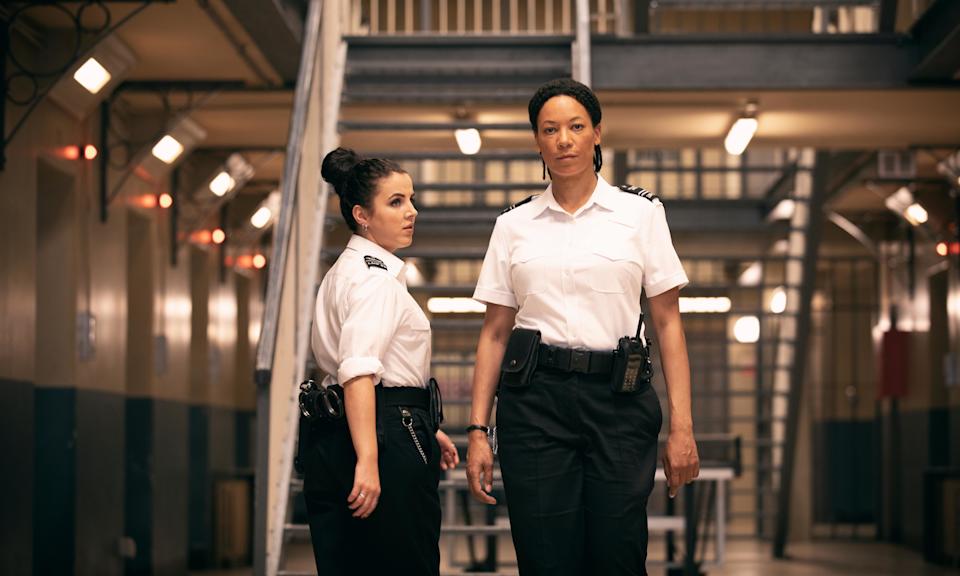Screw review – a warm, witty welcome to hell!

Nina Sosanya and Jamie-Lee O’Donnell star as prison officers in this impeccably observed show about life on the wing … where secrets abound and naked inmates run amok
Prison is a ripe setting for drama, as one of last year’s finest series, Time, proved, but does it suit comedy quite so well? It has been a long time since the days of Porridge, but Screw (Channel 4) is banking on viewers seeing the funny side, promising a comedy-drama that offers more than the familiar misery. There isn’t that much humour in this opening episode, bar the odd witty line or two, though I suspect that when the comedy does come, it will be more on the dry side than characters slipping on contraband banana skins. Instead, it settles somewhere between soap and Sunday night blockbuster, and I mean that as a compliment. This is broad and warm and welcoming, with enough of a sharp side to make it worth sticking with.
Nina Sosanya is Leigh Henry, an officer so dedicated to her job on Long Marsh Prison’s male C-wing that she appears to be secretly living there, in a cell she keeps free for that very purpose. It’s her story, at least to start with. She has spent more of her life working in the prison than out of it, she explains, as she campaigns for a promotion to custodial manager, a role that will allow her to make real change. She’s the officer who cares. The twist is that if she doesn’t get the job, her current position becomes redundant. The stakes are high. All she needs is one slow, boring, normal day on the job to prove she can manage it.
But what would a prison drama be, half comedy or not, if its days were slow, boring and normal? As soon as the first inmate strips off and runs down the stairs, chaos is set in motion. Leigh is the kind of officer for whom even the inmates have begrudging respect. She is kind to them, listens to them, and instinctively knows when it’s best to defuse a situation with humour, rather than a baton. But her underlings are not all on board with her maternal approach. Stephen Wight is Gary Campbell, a weasel who insists that the prisoners brought it all on themselves, spends most of his time moaning about the pay, thinks men’s prisons should be staffed by men only and is the walking, breathing embodiment of the phrase, “It’s PC gone mad.” He prefers to keep the inmates at arm’s length and does the bare minimum required.
Judging by the state of things, it’s hard to blame him entirely. Money is tight, staffing is tighter, and everything is run on a knife’s edge. If an officer doesn’t turn up for work, the prisoners are kept in their cells, because there aren’t enough staff to safely look after them. The detail throughout is strong, from a contraband kettle to cook in – because the other is for coffee – to an underground trade in meals, with fish having the most value, closely followed by chicken. Creator Rob Williams (who also wrote BBC One’s excellent The Victim, aired in 2019) taught in prisons before becoming a screenwriter, and he gives his show the feel of an insider’s perspective, keeping an attentive eye on the frustrations of the staff and inmates.
Nowhere is this more apparent than in the arrival of Rose Gill (Derry Girls’ Jamie-Lee O’Donnell, with a Manc-ish accent here, making a smooth transition to a more serious role), a new recruit who has done most of her preparation for the job via online courses. She arrives on the wing to a greeting of “welcome to hell”, and while she isn’t quite seeing the gnarly ultraviolence of a show like Oz, let’s say – this is a category B prison – she is clearly out of her depth, thrown into the work without so much as a tour of the coffee-making facilities. She gets it wrong when she tries to get it right, so she tries another approach – and gets it wrong again. Leigh is cold and unimpressed, resistant to helping a trainee who is likely to quit within two years, as we are told most of them do. Yet one of the prisoners seems to recognise Rose, and her flustered first day on the job becomes more and more suspicious. Why has she ended up there?
There are more mysteries to unravel, some that remain within the episode, some that should last the series. One inmate seems to recognise a new face on the wing, which sends him into a spin and shows that Screw can do sensitive, too, while Leigh is certainly hiding some bigger secrets than where she is sleeping at night. It’s all very empathic, and though the show is told from the perspective of the officers, it is clearly a gentle plea to see everyone as human, no matter how they ended up where they did.

 Yahoo News
Yahoo News 